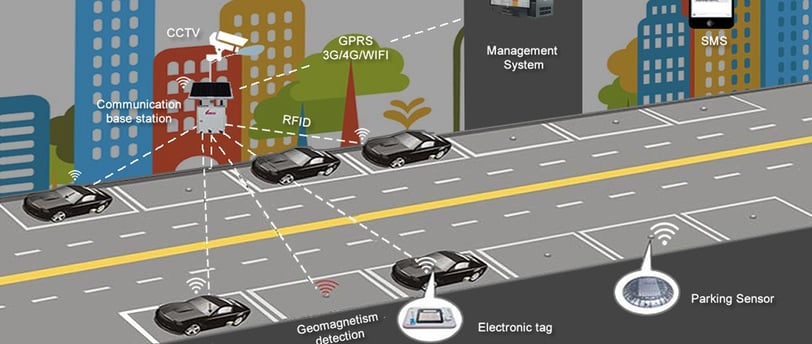Smart Parking: AI's Answer to Urban Congestion
Discover how AI-powered smart parking solutions are tackling urban congestion. Learn how smart parking systems optimize space, reduce traffic, and enhance city living with cutting-edge technology.
Paola Bennardo
2/4/20253 min read


Introduction
Finding a parking spot in a busy city can feel like a never-ending game of hide-and-seek. You circle the block, eyeing every empty space, only to find it taken at the last second. Frustrating, right? Well, AI-powered smart parking solutions are here to end the madness. Imagine a system that directs you to an available spot in real time, reduces traffic congestion, and even helps cut down emissions. Sounds futuristic? It’s already happening!
Let’s dive into how AI is transforming urban parking and making our cities smarter, greener, and more efficient.
The Parking Problem: Why Cities Need AI Solutions
Urban congestion is a growing crisis. According to research, up to 30% of city traffic is caused by drivers searching for parking. This inefficiency results in:
Wasted fuel and higher emissions
Increased stress and frustration for drivers
Unnecessary traffic congestion
Lost productivity and time
As urban populations continue to rise, traditional parking methods simply won’t cut it. That’s where AI-driven smart parking steps in to revolutionize the way we park.
How AI is Powering Smart Parking
AI plays a crucial role in making parking more efficient through a combination of machine learning, IoT sensors, and real-time data analysis. Here’s how it works:
1. Real-Time Parking Space Detection
AI-powered sensors installed in parking lots and city streets detect available spaces and relay the information to a centralized system. These sensors use computer vision, LiDAR, and ultrasonic technology to identify free spots.
2. Predictive Analytics for Parking Availability
Machine learning algorithms analyze historical data to predict high-demand areas and peak parking times. This helps city planners optimize parking layouts and reduce congestion.
3. Smart Parking Apps for Drivers
Mobile apps powered by AI provide real-time parking availability updates. These apps:
Guide drivers to the nearest available spot
Offer digital payment options
Allow users to reserve parking in advance
Popular smart parking apps like Parkopedia, SpotHero, and ParkMobile are already making life easier for drivers worldwide.
4. Automated Parking Systems (APS)
AI-driven automated parking garages use robotics to park and retrieve cars efficiently. These high-tech parking solutions maximize space utilization and eliminate the need for traditional parking attendants.
5. Dynamic Pricing Models
AI-powered dynamic pricing adjusts parking fees based on demand. For example, parking rates may be higher during peak hours and lower during off-peak times, encouraging better distribution of parking spaces.
The Benefits of AI-Driven Smart Parking
The integration of AI into parking systems offers multiple benefits, including:
Benefit How It Helps
Reduced Traffic Congestion Less time spent searching for parking means fewer cars clogging the roads.
Lower Emissions Efficient parking reduces fuel waste, leading to lower carbon footprints.
Improved City Planning AI data helps municipalities optimize parking infrastructure
Enhanced User Convenience Drivers can find, reserve, and pay for parking with ease
Increased Revenue Smart pricing models generate higher revenues for cities and private operators.
Real-World Applications of AI in Smart Parking
Several cities worldwide have already adopted AI-driven smart parking solutions. Here are a few examples:
1. San Francisco’s SFpark
San Francisco’s SFpark program uses AI-powered sensors to monitor parking availability and adjust pricing dynamically. The result? A significant 30% reduction in traffic congestion in some areas.
2. Barcelona’s Smart Parking System
Barcelona has integrated AI with IoT to create sensor-enabled parking spaces that guide drivers to available spots via a mobile app. This has improved traffic flow and reduced emissions.
3. London’s AI Parking Management
London employs AI cameras and real-time data analysis to enforce parking regulations and reduce illegal parking violations.
4. Dubai’s Robotic Parking Garages
Dubai has implemented automated, AI-controlled parking garages that use robotics to park cars efficiently, maximizing space and reducing wait times.
Challenges and Future Prospects of AI in Parking
While AI-driven smart parking is a game-changer, it does come with challenges:
High Implementation Costs: Installing AI sensors and infrastructure requires significant investment.
Data Privacy Concerns: AI relies on real-time data, raising privacy and security issues.
Integration with Existing Infrastructure: Many cities have outdated parking systems that need upgrades.
However, as AI technology continues to advance, we can expect:
Wider adoption of autonomous valet parking—cars that park themselves!
AI-driven smart parking hubs—fully automated parking facilities.
Improved integration with autonomous vehicles—AI-powered parking systems designed for self-driving cars.
Conclusion
AI-powered smart parking is more than just a convenience—it’s a necessity for the future of urban mobility. By reducing congestion, cutting emissions, and making life easier for drivers, AI is transforming how cities manage parking.
So, next time you’re stuck circling the block looking for a parking spot, just remember—AI might soon have the perfect spot waiting for you!
Would you use a smart parking app to find a spot instantly? Let us know in the comments!
AI ZENTRO
Stay updated with the latest AI innovations today.
AI ZENTRO © 2025. All rights reserved.
